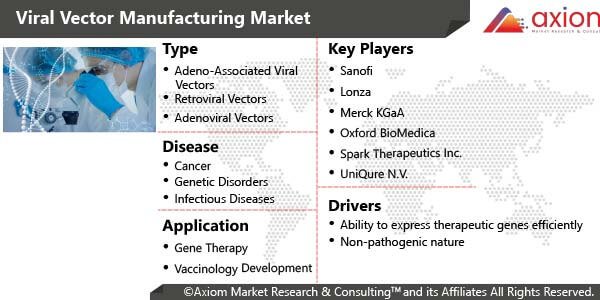Viral vector is the most effective means of gene transfer to modify specific cell type or tissue and can be manipulated to express therapeutic genes. Several virus types are currently being investigated for use to deliver genes to cells to provide either transient or permanent transgene expression. These include adenoviruses, retroviruses, poxviruses, adeno-associated viruses, baculoviruses, and herpes simplex viruses. The choice of virus for routine clinical use depends on the efficiency of transgene expression, ease of production, safety, toxicity, and stability. Furthermore, many types of viral vectors have been used in a wide array of basic and clinical studies, and genetic tools made possible to construct novel viruses intended for gene therapy, but also the development of vaccines. Moreover, in gene therapy, viral vectors can be applied to treat different diseases such as, metabolic diseases, heart defects and neurodegenerative disorders. Additionally, in vaccinology, a growing level of information supports recombinant viral vector usage as a means of vaccination. Studies have demonstrated that, when antigen-expressing viral vectors are used, the elicited T- and B-cell responses are both wider and of a greater order of magnitude than after DNA immunization alone. Owing to various applications, the Viral Vector Manufacturing market is expected to propel in near future.
Viral Vector Manufacturing Market Outlook
The viral vector manufacturing market is driven by key factors such as rising prevalence of genetic disorders, cancer and infectious diseases, advancement in biotechnology, diagnostic research & pharmaceuticals and ongoing research into viral vector-based gene and cell therapies. However, huge cost associated with gene therapy and short shelf-life of viral vectors are some of the factors hampering the market growth.
Viral Vector Manufacturing Market Segmental Overview
The viral vector manufacturing market is segmented by type, disease, application, end user and geography
Viral Vector Manufacturing Market by Type
Based on type, the viral vector manufacturing market is segmented into retroviral vectors, adenoviral vectors, adeno-associated viral vectors and others viral vectors. Furthermore, retroviral vectors is bifurcated into lentiviral vectors and gamma-retroviral vectors. Moreover, other viral vectors segment is sub segmented into poxviruses, baculoviruses and herpes simplex viruses. There has been a resurgence in gene therapy efforts that is partly fueled by the identification and understanding of new gene delivery vectors. Adeno-associated virus (AAV) is a non-enveloped virus that can be engineered to deliver DNA to target cells, and has attracted a significant amount of attention in the field, especially in clinical-stage experimental therapeutic strategies.
Viral Vector Manufacturing Market by Disease
The disease discussed in this market are cancers, genetic disorders, infectious diseases and other. Cancer segment accounted for the largest market share in 2018. Its large share can be attributed to growing research on viral vector gene therapies for cancer.
Viral Vector Manufacturing Market by Application
Various application are studied in this report such as gene therapy and vaccinology. Due to increase in the number of gene therapy clinical trials conducted for chronic diseases such as cancer, cardiovascular diseases, and neurodegenerative diseases globally, the viral vectors are largely used in gene therapy segment.
Viral Vector Manufacturing Market by End User
Based on end user, the viral vector manufacturing Market is segmented into pharmaceutical & biopharmaceutical companies and research institutes. A robust pipeline of viral vector gene therapies and successful launch of such therapies are the key factors contributing to the development of the pharmaceutical and biopharmaceutical companies segment during the forecast period.
Viral Vector Manufacturing Market by Geography
Geographically, the viral vector manufacturing market is classified into North America, Europe, Asia-Pacific and Rest of the world. North America region accounted for the largest market share in viral vector manufacturing market in 2018, due to rising commercial research in personalized medicines, availability of better R&D facilities and the presence of advanced technologies. However, Asia-Pacific is anticipated to be the fastest-growing region for the viral vector manufacturing market, primarily due to the development of government policies, growing focus on research and development activities in the health care sector and rising research activities to launch novel gene therapies in this region.
Viral Vector Manufacturing Market Key Players
Some of the major players operating in the viral vector manufacturing market includes Lonza, Merck KGaA, Oxford BioMedica Plc., Cobra Biologics, Novasep Inc., Spark Therapeutics, Kaneka Eurogentec, Finvector Vision Therapies, Brammer Bio, Cell and Gene Therapy Catapult (CGT Catapult), Fujifilm Holdings Corporation, Uniqure, Regenxbio and Massbiologics. Leading companies have invested massive capital in new product launchs, research & development and mergers & acquisitions activities to develop innovative products in the market.
Viral Vector Manufacturing Market Developments
November 2017: Lonza and Akouos, announced their strategic license agreements for exclusive rights to the ancestral adeno-associated viral vectors (Anc-AAV) gene therapy platform for all hearing and balance disorders. The agreement with Akouos is designed to accelerate AAV gene therapy for hearing and balance disorder.
April 2018: Lonza opens the world's largest dedicated cell-and-gene-therapy facility, which was built in anticipation of the rising demand from developers of cell and gene therapies, the next era in medicine and with the mission of enabling them to deliver these types of treatments to patients around the world more quickly and efficiently.
December 2017: Merck announced a commercial supply agreement to manufacture viral vectors for bluebird bio, Inc., of Cambridge, Massachusetts, USA, for its use in potentially transformative gene therapies.











